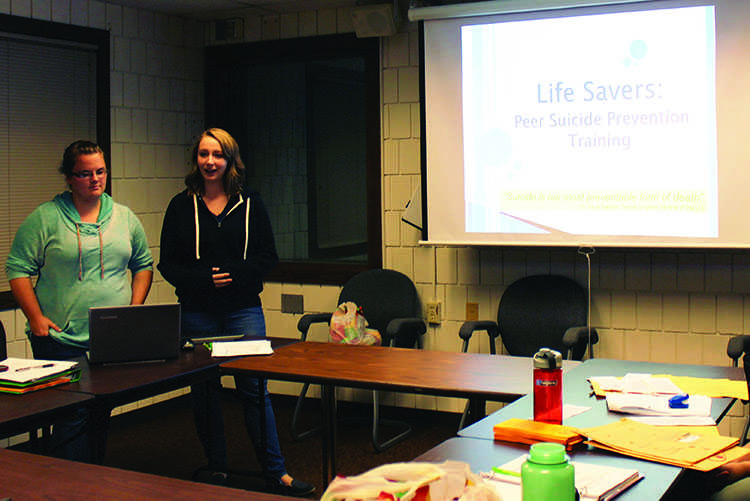Taking action to prevent suicide on campus
Collaborative program works to educate and reduce stigma
Photo by Rachel Streich
As a senior English major at UW-Eau Claire, Dan Gerbec was a creative student and the kind of guy who would go out of his way just to get rid of the spiders in other students’ dorm rooms, his mother said. He was kind, and he had many friends. He hoped to write for a nonprofit organization when he graduated.
Beyond these attributes that people associated with him, his mom, Betsy Gerbec, said no one had any idea that he was, as later found in his journal, “fighting a losing battle with depression.”
“Nobody knew he was going to do this,” she said.
Dan Gerbec died by suicide on Sept. 27, 2012, by taking a large dose of anti-depressants. Betsy Gerbec said there was no final warning.
To work toward the goal of never losing another student to suicide, psychology professor Jennifer Muehlenkamp started a program for suicide prevention at UW-Eau Claire in 2013. SPARC, Suicide Prevention and Research Collaborative, is taking new steps this year to raise awareness and reduce stigma about mental health, as well as to educate students about suicide and its risks.
A continuing collaboration
After the program received Provost Initiative Blugold Commitment funds last year, Muehlenkamp helped form relationships and began coordinating projects with multiple entities on campus including Academic Affairs, Center for Alcohol and Studies and Education, Counseling Services, Student Health Service, Residence Life and the Women’s and LGBTQ Resource Center.
“To help prevent suicide among college students on a campus, you need to address multiple different things,” Muehlenkamp said.
Efforts this year consist of research, a suicide peer educator group, outreach to faculty, a mental health promotion educational program, a suicide prevention Web page for Counseling Services and other resource development.
As she holds a doctorate in clinical psychology and has expertise in suicidology, Muehlenkamp said these initiatives are important because suicide personally affects students as well as friends and family members, and she believes there is a need for programs addressing mental health issues on campus.
As Muehlenkamp found in a random sample of Eau Claire students in 2012, 1.8 percent of students reported they had attempted suicide, amounting to approximately 200 students. Suicide is also the second leading cause of death among college students, according to theSuicide Prevention Resource Center.
But there is hope, Muehlenkamp said, and suicide is preventable.
“We can make a difference,” she said, “and it’s about taking care of ourselves and looking out for each other.”
Students reach out to students
Students across campus have committed to helping their peers combat suicide. In different roles, 13 UWEC students are currently working with SPARC, whether it is researching or spreading the message of how students can come together to help each other.
“Peers and that connectedness is our biggest effort to prevent suicide,” Muehlenkamp said. “It’s the strongest force we have.”
This is because students are more likely to turn to their peers first for help than anyone else, she said.
The Life Savers are a group of four peer educators who will present information to students about preventing suicide and being aware of warning signs as well as directing friends to help.
They will begin presenting in classes such as Psychology 100 this week and could expand to student organizations or any other group that sees a need to hear the information.
Molly Bray, a senior social work major and member of the team, said she first became interested in the issue of suicide after a spring break trip toPine Ridge, a Native American reservation in South Dakota with a high suicide rate.
“It’s a topic that I didn’t realize how big of an effect it has,” she said. “I want to work on preventing it here.”
Bray said even if suicide has not directly affected a student, it is important to become aware of the information in the presentation so students can know where to point others and what to say if they encounter a person who is contemplating suicide.
Lisa Quinn-Lee, a social work professor and co-advisor the Life Savers team, said the hope is to develop a safe space where people can ask questions and learn about the subject.
“I think that by coming and giving this presentation, the students will give permission to talk about suicide,” Quinn-Lee said.
The students involved also gain skills in public speaking, research and group work, she said.
Casey Bloechl, a junior psychology major involved with Life Savers, said working with the team has real-world applications, and she has learned about how to pay attention to students around her who are struggling.
“We just need to remember to listen to each other,” she said. “And sometimes that’s not very easy.”
She said she is looking forward to engaging with students in this conversation and see what comes from the group’s work.
Spreading support in the future
As the Life Savers team and other students continue their endeavors, Counseling Services also plays a key role in preventing suicide through efforts such as implementing training for faculty and using a suicide assessment previously developed through SPARC that focuses on treating suicidality in students.
Counselor Luke Fedie said, through SPARC, Counseling Services hopes to provide an even more effective resource to students who might be dealing with mental health issues or having suicidal thoughts.
He said this ongoing effort will allow students to have an open dialogue about the topic.
SPARC will continue to work on campus as well as in the Eau Claire community, Muehlenkamp said. The goal is to convey messages of hope and understanding, she said, so what happened to Dan Gerbec and other students does not happen with anyone else.
To help remove the stigma and shame around mental health issues, Gerbec has made it a priority to openly speak about suicide and its potentially devastating outcomes.
“We have to talk about the people that we love that did this and how much hurt it has left behind, and how it didn’t solve any problems,” she said.
In the midst of her loss, Gerbec refused to allow the Dean of Students to state that her son just “died unexpectedly” in a mass email to the student body two years ago.
“I said, ‘Don’t you dare,’” she said. “I’m not ashamed of him, and students need to know that this happens so they don’t do it.”







